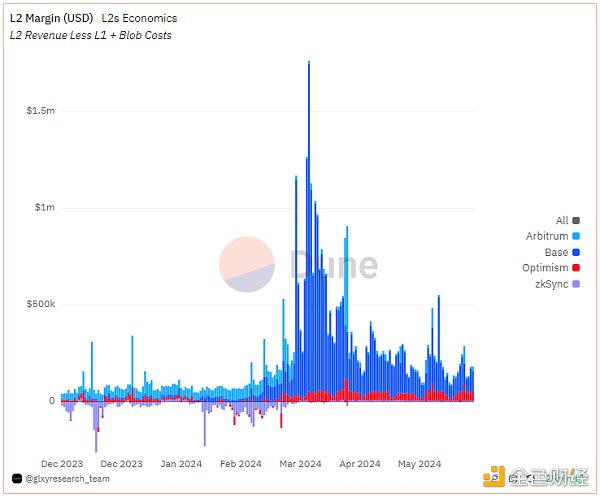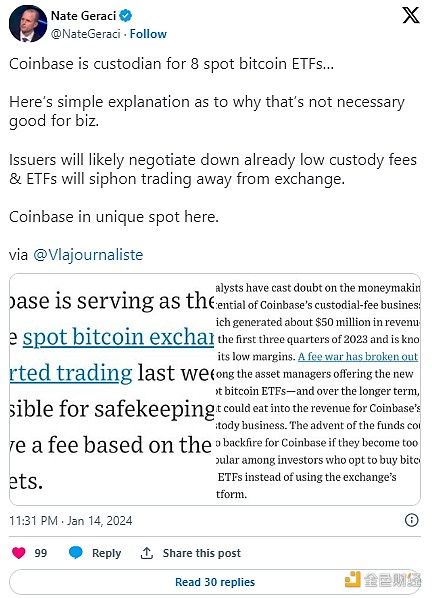Author: Jack Inabinet, Bankless; Translated by: Wuzhu, Golden Finance
Coinbase stock has long been the go-to choice for investors seeking exposure to cryptocurrencies through ownership of publicly traded companies, but another company is increasingly vying for that crown…
Last Thursday, Robinhood announced it would double down on crypto with its $200 million acquisition of Bitstamp, the oldest active cryptocurrency exchange in existence with valid licenses to operate in over 50 countries!
Should you buy COIN or HOOD stock?
Today, we’ll explore the differences between Coinbase and Robinhood to understand why investors are bullish on both stocks.
Why bullish on COIN?
Coinbase is often considered the most reputable cryptocurrency exchange, a distinction that has given it a deep connection with both U.S. retail and institutional crypto enthusiasts over its 12-year history.
Centralized cryptocurrency exchanges typically provide limited insight into their financials; however, as a public company on a U.S. stock exchange, Coinbase is subject to rigorous audits and submits corresponding reports to the SEC, which reduces the likelihood that customer funds will be misappropriated.
While the most familiar function of any exchange is the trading function, Coinbase is more than just a simple marketplace; the company is a pioneer in on-chain CEXs and has played a major role in infrastructure development, launching its own wallet and Ethereum L2 Base!
Thanks to the implementation of EIP-4844 in Ethereum’s March Dencun upgrade, the cost of publishing data on the L2 has dropped significantly, Base’s on-chain operating profit margin has increased to almost 100%, and almost every penny of transaction fees can be remitted directly into Coinbase’s coffers.
While Base’s revenue has dropped significantly from the peak of congestion in late March, the network is the second largest L2 by TVL and generates more profit than any other major L2, according to L2BEAT calculations, with net profits often exceeding $100,000 per day.

In addition to on-chain infrastructure, Coinbase also provides users with comprehensive custody tools, providing white glove staking services (as well as ETH liquidity staking tokens) in addition to institutional-grade custody solutions.
Coinbase Custody is widely regarded as the preeminent digital asset custody provider and services 8 of the 11 US spot BTC ETFs, including Grayscale’s GBTC and BlackRock’s IBIT (the two largest such products in terms of assets under management). This arrangement enables Coinbase to earn custody fees from the assets it manages, as well as trading fees for creation and redemption, which will provide a strong revenue driver for the company if spot crypto ETFs continue to gain traction with traditional market participants.

Crypto payments have yet to achieve mainstream adoption, but the Coinbase team has developed the infrastructure needed to make this happen through its Commerce platform, which enables merchants to accept hundreds of crypto assets as payment for goods and services directly into their self-custodial crypto wallets.
The public's further willingness to hold crypto assets and recognition of the benefits that come with self-custody technology will benefit Coinbase in generating revenue from the platform.
Coinbase also caters to international users who are not bound by U.S. financial regulation, and they can access futures on a variety of crypto assets through the exchange; these services could easily expand to the U.S. platform — which currently only offers BTC and ETH futures — if the crypto industry gains positive regulatory clarity.
As an added side benefit, holders of COIN shares can receive a small upside from the success of the Coinbase Ventures portfolio, which contains many lucrative private market opportunities that are inaccessible to retail and outside investors.
Why Bullish on HOOD?
While Coinbase is ahead of Robinhood in terms of the volume of crypto transactions processed, Robinhood remains the undisputed champion for U.S. retail traders.
Despite having fewer assets managed on the Robinhood platform than Coinbase (even when the former’s stock, options, cash, and crypto balances are added together), it had 70% more monthly active users than Coinbase in the first quarter of 2024, highlighting the exchange’s popularity among retail traders.
Undeniably, Robinhood’s biggest advantage is regulatory compliance; the exchange is regulated as a broker by the U.S. Securities and Exchange Commission (SEC), and if a new classification of digital asset securities falls within the agency’s purview and trading in them is restricted to registered brokers, then Robinhood is well positioned to become the dominant cryptocurrency exchange.

While Coinbase is clearly the more crypto-native company and has attracted a slew of well-connected talent in the industry, there is nothing stopping Robinhood (except regulatory uncertainty) from creating its own crypto app.
Robinhood has developed its own proprietary non-custodial wallet solution and recently launched an integration that enables users to purchase crypto directly from the Uniswap mobile app using funds in their Robinhood Connect account!
With its proposed acquisition of Bitstamp (which could still be blocked by regulators), Robinhood acknowledges the growth potential of its crypto business despite its ongoing legal dispute with the SEC over its crypto business and confirms that it will do everything it can to get involved with blockchain technology.
Bitstamp’s 4 million active users are primarily based in Europe — a highly desirable demographic for U.S.-centric buyers — and the acquisition, which includes the transfer of Bitstamp’s core products for staking and lending, allows Robinhood to better compete with the service offerings of crypto CEXs and highlights that it can simply buy crypto technology developed by others to catch up to crypto-native competitors.
Summary
For crypto investors who are already bullish on COIN, it would be easy to have similar confidence in HOOD, as the company appears to be aggressively moving into the crypto market and has already won over U.S. retail investors, who are highly likely to enter the crypto space if the industry sees another frenzy given the presence of easy buying/custody solutions.
Coinbase, on the other hand, has a proven track record of crypto performance and has benefited from significant institutional adoption, as evidenced by spot crypto ETF issuers’ preference for its services.
Both publicly traded exchanges have their own unique strengths and weaknesses, and while Robinhood is currently at a disadvantage in this race, Coinbase’s dominance is by no means certain, especially in the face of tighter crypto-finance regulation in the future.
 JinseFinance
JinseFinance
 JinseFinance
JinseFinance Miyuki
Miyuki Xu Lin
Xu Lin Bitcoinist
Bitcoinist decrypt
decrypt cryptopotato
cryptopotato Beincrypto
Beincrypto Coindesk
Coindesk Cointelegraph
Cointelegraph Cointelegraph
Cointelegraph